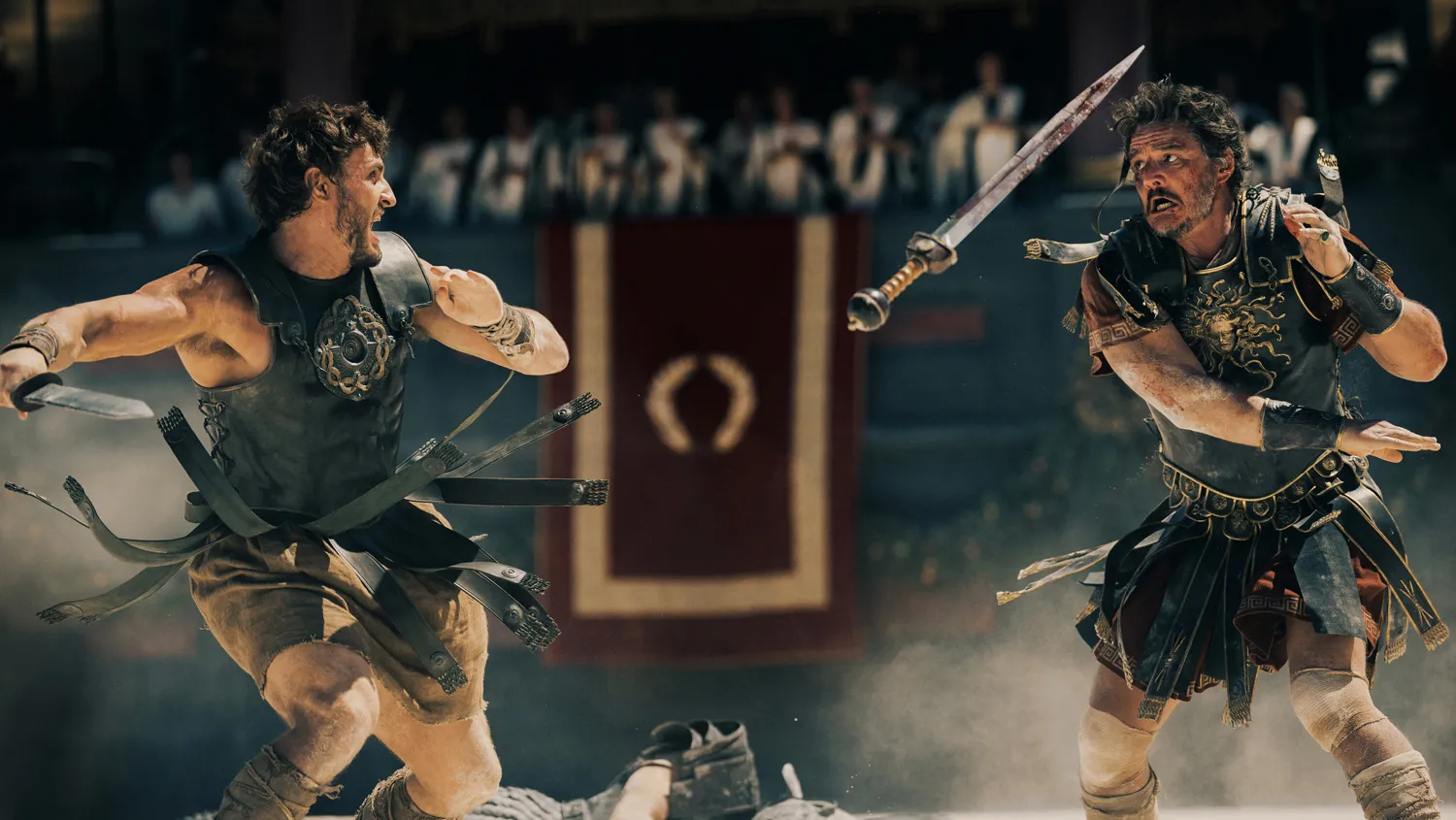When rewatching Gladiator in preparation for its long-awaited sequel, I was surprised at how melodramatic it was. I had remembered the film only for its epic scope, quotable monologues, and sweaty brawls. I had forgotten its moments of deep emotion found not just in Maximus (Russell Crowe) mourning his murdered family but also in the sincere male bonding between Maximus and his fellow Gladiators. It is a surprisingly intimate film which now feels small compared to today’s industrial behemoths. Even that famous line “Are you not entertained?” was delivered not in the Colosseum, as I remember, but in a makeshift arena on the edge of the Empire. However, in his follow-up, Ridley Scott dives head-first into oversized, operatic filmmaking and delivers perhaps his biggest, brashest film yet.
Gladiator II begins sixteen years after the original but starts once again with a Roman army conquering a barbarian outpost. This time in North Africa as a Roman fleet besieges a city. Amongst its defenders is Lucius (Paul Mescal), son of Lucilla (Connie Nielsen) and Maximus. After the events of Gladiator, Lucilla sent him away for fear he would be assassinated as the true heir to the Roman throne, but now, living under the name Hano, he has been captured as a Roman slave and forced to fight as a Gladiator in the same makeshift arenas his father was. Lucius is soon bought by Macrinus (Denzel Washington), a wealthy arms dealer who brings him to Rome to fight in the games thrown by Rome’s new villainous twin emperors Geta (Joseph Quinn) and Caracalla (Fred Hechinger). There Lucius wins over the hearts of Rome’s crowds while caught up amid political power plays between the emperors, the senate, his mother, and a conniving Macrinus. If this all sounds a tad familiar, that is because Gladiator II’s plot hews so close to its predecessor as to be practically a remake. Ridley Scott seems content on hitting all the same thematic, plot, and character beats as the original, and everything plays a little like a greatest hits track.

However, where Scott does innovate is in the film’s scale, as he cranks everything up till it reaches new heights of spectacle and bombast. The set pieces are bigger, the action brasher, the muscles sweatier, the blood more splattered, and the intrigue more sinewy. Scott throws fireballs, rabid monkeys, a gladiator standing aloft a rhino, and even sharks at the screen. The result is a ruggedly handsome film containing an extravaganza of action. However, as Scott fills the Colosseum with water for the film’s much-trailered naval battle, he also drowns out the emotion and sincerity which turned Gladiator into a classic. The sentimental vein which ran through the core of the original is missing, and the brotherhood of its Gladiators is not so present. Gladiator II feels hollow, mechanical, and an exercise in fan service that lacks the heft necessary to lend it a satisfying core. As the Gladiatorial battles of ancient Rome became more extravagant to distract from its crumbling regime, so too do Gladiator II’s bigger set pieces aim to divert attention away from its missing heart. Gladiator II is a supersized but merely serviceable sequel.
The film also mishandles Paul Mescal as its lead. While his look is certainly there, with Mescal sporting a meaty muscularity which stands out against the manicured physiques of Marvel actors, the film fails to embrace the tender masculinity that defined his earlier roles. Mescal is at his best when he is allowed to play characters who are charming yet vulnerable, who demonstrate such confidence yet also contain such fragility. This has transformed him into this generation’s sensitive male pin-up, and it seems perfectly suited to the wrought emotionality of a Gladiator film. However, he is instead forced into playing Lucius as a lesser copy of Maximus while having rousing speech after rousing speech thrust upon him. Lucius’ depiction sadly doesn’t play into Mescal’s strengths, and it leaves everything feeling a bit pantomime.

The same goes for Quinn and Hechinger as the twin emperors, who are deliciously mad but lack the human spark which made Joaquin Phoenix’s Commodus so sinister. Pedro Pascal is great as Marcaus Acacius, blending theatricality and earnestness in his portrayal of Rome’s most celebrated general. Connie Nielson is sadly given little to do, while the only other returning actor from the original, Derek Jacobi, simply appears every so often. The MVP this time around is undoubtedly Denzel Washington, who is having an absolute ball, politicking, glad-handing and chewing the scenery to his heart’s content. It is a brilliant performance which holds the film together as it barrels along to its rather slack conclusion. However, between his American accent and Macrinus’ affectatious character, Washington does feel like he has wandered in slightly tipsy off the casino floor of Caesar’s palace rather than the streets of ancient Rome.
But perhaps that is the point. Perhaps the whole thing is meant to feel like being in the grand, unrestrained madness of a Vegas showroom, or that bizarre sphere, being fed course after course of delirious action but without anything to really nourish you. Was I not entertained? I certainly was. Was I moved? I sadly was not.

